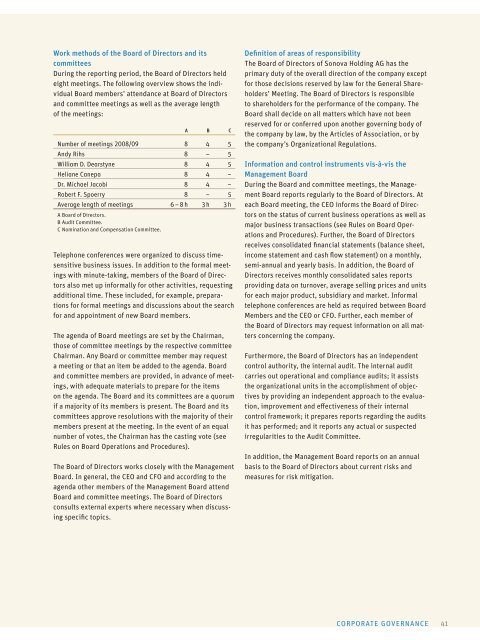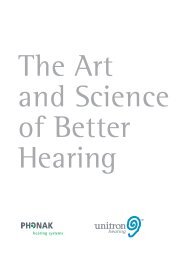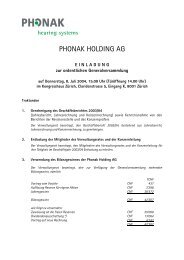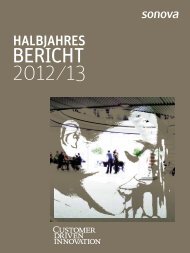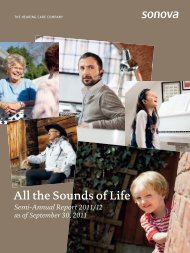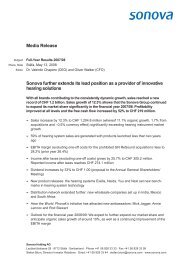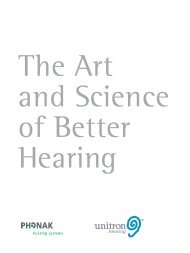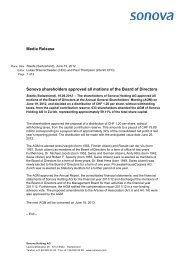ANNUAL REPORT 2008/09 - Sonova
ANNUAL REPORT 2008/09 - Sonova
ANNUAL REPORT 2008/09 - Sonova
Create successful ePaper yourself
Turn your PDF publications into a flip-book with our unique Google optimized e-Paper software.
Work methods of the Board of Directors and its<br />
committees<br />
During the reporting period, the Board of Directors held<br />
eight meetings. The following overview shows the individual<br />
Board members’ attendance at Board of Directors<br />
and committee meetings as well as the average length<br />
of the meetings:<br />
A B C<br />
Number of meetings <strong>2008</strong>/<strong>09</strong> 8 4 5<br />
Andy Rihs 8 – 5<br />
William D. Dearstyne 8 4 5<br />
Heliane Canepa 8 4 –<br />
Dr. Michael Jacobi 8 4 –<br />
Robert F. Spoerry 8 – 5<br />
Average length of meetings<br />
A Board of Directors.<br />
B Audit Committee.<br />
C Nomination and Compensation Committee.<br />
6 – 8 h 3 h 3 h<br />
Telephone conferences were organized to discuss timesensitive<br />
business issues. In addition to the formal meetings<br />
with minute-taking, members of the Board of Directors<br />
also met up informally for other activities, requesting<br />
additional time. These included, for example, preparations<br />
for formal meetings and discussions about the search<br />
for and appointment of new Board members.<br />
The agenda of Board meetings are set by the Chairman,<br />
those of committee meetings by the respective committee<br />
Chairman. Any Board or committee member may request<br />
a meeting or that an item be added to the agenda. Board<br />
and committee members are provided, in advance of meetings,<br />
with adequate materials to prepare for the items<br />
on the agenda. The Board and its committees are a quorum<br />
if a majority of its members is present. The Board and its<br />
committees approve resolutions with the majority of their<br />
members present at the meeting. In the event of an equal<br />
number of votes, the Chairman has the casting vote (see<br />
Rules on Board Operations and Procedures).<br />
The Board of Directors works closely with the Management<br />
Board. In general, the CEO and CFO and according to the<br />
agenda other members of the Management Board attend<br />
Board and committee meetings. The Board of Directors<br />
consults external experts where necessary when discussing<br />
specifi c topics.<br />
Defi nition of areas of responsibility<br />
The Board of Directors of <strong>Sonova</strong> Holding AG has the<br />
primary duty of the overall direction of the company except<br />
for those decisions reserved by law for the General Shareholders’<br />
Meeting. The Board of Directors is responsible<br />
to shareholders for the performance of the company. The<br />
Board shall decide on all matters which have not been<br />
reserved for or conferred upon another governing body of<br />
the company by law, by the Articles of Association, or by<br />
the company’s Organizational Regulations.<br />
Information and control instruments vis-à-vis the<br />
Management Board<br />
During the Board and committee meetings, the Management<br />
Board reports regularly to the Board of Directors. At<br />
each Board meeting, the CEO informs the Board of Directors<br />
on the status of current business operations as well as<br />
major business transactions (see Rules on Board Operations<br />
and Procedures). Further, the Board of Directors<br />
receives consolidated fi nancial statements (balance sheet,<br />
income statement and cash fl ow statement) on a monthly,<br />
semi-annual and yearly basis. In addition, the Board of<br />
Directors receives monthly consolidated sales reports<br />
providing data on turnover, average selling prices and units<br />
for each major product, subsidiary and market. Informal<br />
telephone conferences are held as required between Board<br />
Members and the CEO or CFO. Further, each member of<br />
the Board of Directors may request information on all matters<br />
concerning the company.<br />
Furthermore, the Board of Directors has an independent<br />
control authority, the internal audit. The internal audit<br />
carries out operational and compliance audits; it assists<br />
the organizational units in the accomplishment of objectives<br />
by providing an independent approach to the evaluation,<br />
improvement and eff ectiveness of their internal<br />
control framework; it prepares reports regarding the audits<br />
it has performed; and it reports any actual or suspected<br />
irregularities to the Audit Committee.<br />
In addition, the Management Board reports on an annual<br />
basis to the Board of Directors about current risks and<br />
measures for risk mitigation.<br />
CORPORATE GOVERNANCE<br />
41


